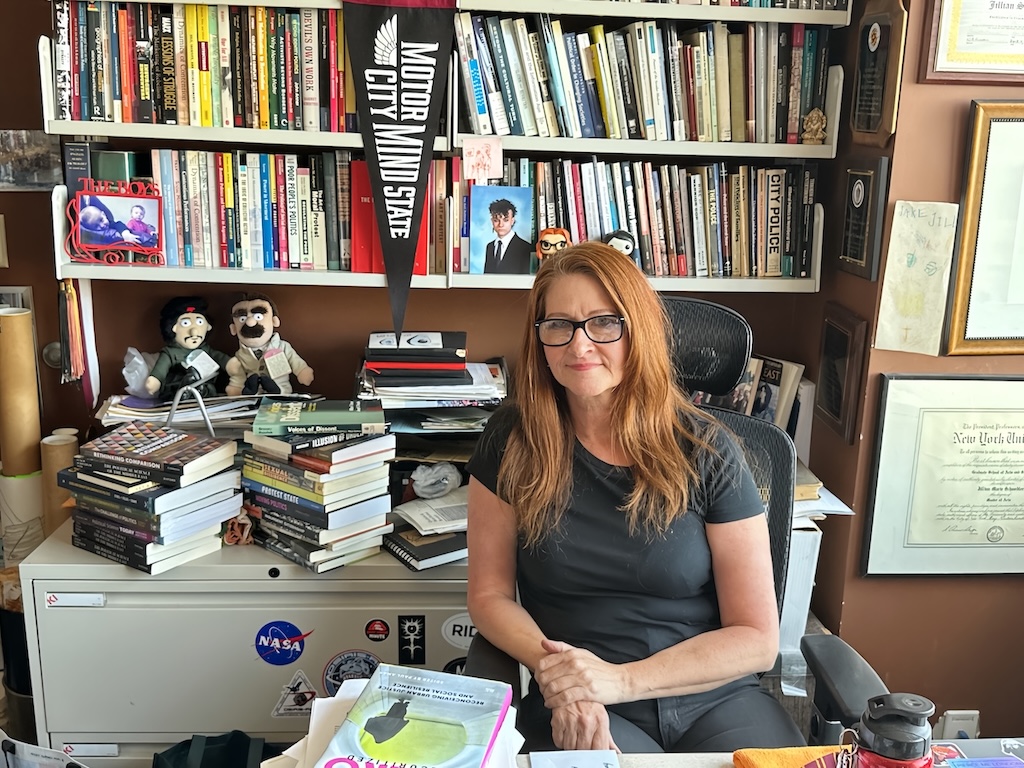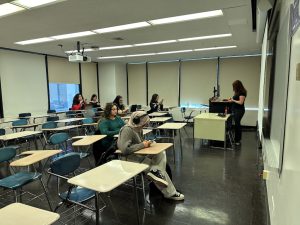
The west building office is cluttered with accolades. Some are certificates of appreciation and degrees. There are photos of her children, coworkers, stickers, and every book imaginable. At the center of it all is Jillian Schwedler, a professor with a storied history of research, adventure, and knowledge.
As a Michigan native, Schwedler came to New York City to make it big on Broadway. She still dances to this day and has led numerous shows back home. Although Broadway didn’t work out, she found her second passion, Middle Eastern Studies. Schwedler was enrolled as a Near East literature major at NYU, though she got her first taste of the region through a roommate she met in Harlem. The roommate, she said“ “did backpack trips, and I didn’t know that was a thing,” Schwedler told me. Their first trip together was to Syria and Türkiye.
Since then, Schwedler has been to Egypt, Jordan, and Yemen for her travels. She started in Egypt, where she entered an immersion program that taught her Arabic and allowed her to do research in Cairo. Her dissertation journeys led her to study Islamic political parties in Jordan and Yemen. She has recounted many stories of triumph and loss. Schwedler often discussed her travel to Yemen in the past tense, emphasizing that the Yemen she traveled to no longer exists. With the onset of the Yemeni civil war, many of her memories there lead to rather overwhelming feelings.
The current Yemeni conflict has taken an estimated 377,000 deaths between 2015 and the beginning of 2022, according to The Council on Foreign Relations. The war was initiated because of the Arab Spring where pro-democracy sentiments came to head with existing authoritarian rule, reported The Guardian. “Since the war in Yemen, a lot of people I know have been killed, and since last year, I know a lot of people who have family members who have died,” said Schwedler. “And I’m in a privileged position,” she told me, yet she feels helpless.

It’s an interesting position to have as a researcher. You get to gain connections and write about the world around you, but in essence, you get to leave. Schwedler would often cope with these feelings of helplessness and overwhelm by taking a step back. By this, Schwedler suggested turning off the news and taking time to yourself. “If you’re not okay, they’re not okay.” This was about the fact that as a professor, she still needed to be there for her students even if she needed to step back, but she also wanted to emphasize that stepping back really did help her through such tough news. Schwedler essentially suggested that one regroups before fighting for change once more.
Given Schwedler’s history with places of conflict, the discussion shifted to discuss the United States’ uncertain political future and the worry the current U.S. election has permeated through many. Despite the evident feelings of dismay in the room, she suggests some hope. Although there isn’t an active conflict in the United States, fears of uncertainty still linger, especially in recent months.
Schwedler mentioned that “this sort of post-truth environment where facts don’t even matter, where crimes you’ve committed don’t disqualify you, where you support people no matter what they do—yea, that’s all very troubling. Mobilization through fear historically is not a good path.” One can see such characteristics throughout the world right now as populism becomes more commonplace such as in India with Modi or Argentina with Milei. It has illuminated the disillusionment of many Americans towards the political system, creating a demonization of fellow citizens. “It’s the fearmongering that really scares me,” she told me referencing the political divisions exposed by the recent U.S. elections.
Her sage advice to Americans and students during this era of uncertainty was that “insisting to educate yourself is a revolutionary act.” Although Schwedler didn’t mention anything specifically, she alluded to the act of attending classes at institutions such as Hunter being imperative. Despite times seeming rough, the root of certainty and progress is education. One must understand how our society works before one can advocate for a better future.
Schwedler justifies her plea for education because, to her, the power that she sees and the ‘us versus them’ rhetoric are all products of fear from those in power. As long as movements persist in their challenge of authority, Schwedler believes that a different future is still possible and young people will be at the helm. “Positive or progressive change is not impossible, and the fight against progressive voices is so ugly and brutal because they are afraid. I think it’s important to understand that the power is simmering below the surface, it just must form,” she said.
To Schwedler, the past election may lead to uncertainty, but that doesn’t mean that a fight is lost. Her past contains chapters of joy and curiosity, but also stories of hardship which act as both warnings and solace for an ever-changing United States.
